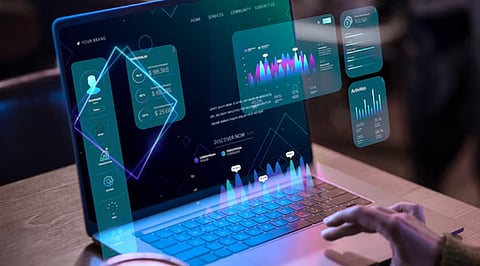

Artificial intelligence and data analytics are profoundly and rapidly changing the digital marketing landscape, giving businesses unprecedented opportunities to not only connect with consumers, but also have measurable outcomes. As organizations begin to embrace these technologies, marketing strategies are maturing in sophistication toward more personalized and data-driven, and thus more efficient models, which are starting to prepare organizations for an era of transformative growth from 2025 and beyond.
A key trend shaping digital marketing is AI personalization. Marketers now have complex, real-time algorithms that can analyze massive amounts of consumer data. Using those insights, marketers are now delivering custom content, offers, and experiences at levels we've never seen before. The depth of personalization in today's marketing not only increases engagement, but it also improves conversions. In 2025, AI is re-defining the digital marketing landscape by enhancing hyper-personalization, smarter customer insights, and automation. It's paramount for businesses focused on production, distribution, and ROI to consider AI as a means of Transforming Digital Marketing and informing a holistic marketing mix. AI is amplifying our ability to inform consumers about products and solutions based on an ever-increasing understanding of their behaviors. Leveraging AI and our understanding of user experiences can lead brands to relevant information that addresses consumer need and preference, creating a seamless journey that translates to loyalty and long-term value.
Data analytics tools are an important part of any marketer's toolkit, allowing marketers to make evidence-based decisions and improve campaign efficacy. By aggregating and analyzing data from multiple channels—social, email, web traffic, etc.— analytics tools offer insights that marketers can actionable insights that guides everything from the content strategy creation to budgetary spending. Analysts are not only in marketing, but in other sectors that deal with complex consumer data, such as finance, entertainment and even sports leverage analytics and data to reduce risk. For example, firms partnered with the best online sportsbooks use real-time consumer data, enabling them to utilize analytics tools to target the right audience while ensuring regulations. They are going to be more successful in such a competitive industry. Being able to visualize trends, segment audiences and predict outcomes means marketers are able to pivot both strategy and budget quickly, while maximizing opportunities emerging.
In addition to AI and analytics, new technologies like blockchain are starting to impact digital marketing efforts. Blockchain's potential to bring transparency and security to industries reliant on trustworthy data and integrity opens endless opportunities for marketers to consider the implications of decentralized approaches to validating ad impressions, reducing fraud, and protecting user privacy. When this technology becomes mainstream and scalable across industries, early adopters will likely set a new standard for accountability and trust among consumers. AI, analytics, and blockchain will cross over, resulting in a future for marketing and results which are not only more effective but more ethical and transparent, as well.
The convergence of AI, analytics, and emerging technologies is fundamentally transforming the way businesses think about digital marketing. In a willingness to embrace these innovations in full, organizations can expect more holism, more consumer insights and more applicable experiences, while crafting new competitive advantages within a highly competitive marketplace. With industry opportunities evolving, we will need to continually stay aware, moving fast enough, thriving in an digital world.
